I imagine it began as bird songs. Then with rhyming words and clapping patterns. Then the children sang hymns, probably learning shape-note singing. They met in schools, churches, cabins and camp meetings. They sang to play, to mourn, to cherish love, to speak to the divine, to heal, and to harmonize together. They sang secrets of the Underground Railroad and to bid farewell. American music helps us feel grace and find the harmonies and the compromises that keep us together.
Traveling On
The Library of Congress presents a short history of African American Spirituals.
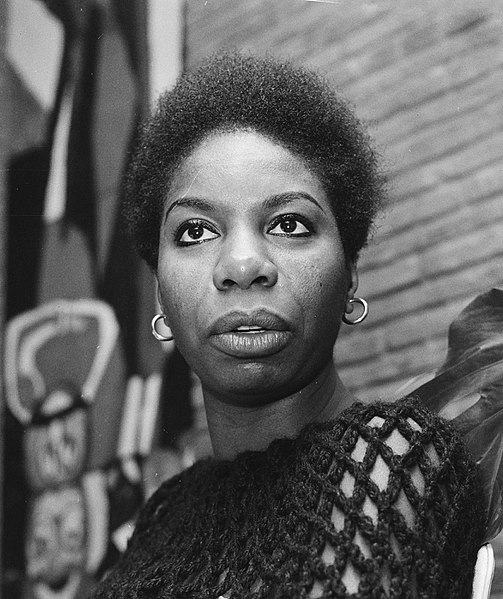
Nobody's Fault But Mine is traditional Blues Gospel.
Hear Nina Simone with paino in 1969.
Music traveled with people, everywhere they went. Mariah, who cannot hold a tune, is deeply affected by the music around her. Hearing a song, she realizes that Hester and Otis have a music community that does not include her.
I pumped water into the bucket. Then Hester sang with a voice that shattered the blue: Nobody’s fault but mine. Nobody’s fault but mine. I say, I had a mother who could pray I had a mother who could pray If I die and my soul be lost, Nobody's fault but mine. She had not let me hear her sing but once before that day. I guessed then what I was missing the evenings Hester and Otis joined the neighbors on the west side.
Otis and Hester attend meetings at a safehouse on Pine Street. After dark, they bring men and women fleeing slavery to give them direction and strength to travel on. Mariah must learn by stealth.
Through the dark I followed her to a ramshackle house at the end of Pine Street. She said something quiet and the door opened. I kept myself close to the woodpile and looked up into a web of branches and dry leaves. Rhythmic hands and feet were making an instrument of the old wood house. I knew flatfooting from Stoneville but this was without a fiddle or a banjo, only hands and feet disturbing the surface of the deep. The feet quieted down to a slow thumping. The men were humming some misery they shared. Then song hovered like a spirit: Wade in the Water Wade in the water, children Wade in the water God’s going to trouble the water Though the windows were shut tight, I could pick out Otis in the harmonies. That was a deep voice getting deeper like water.
The Compromise, “Black Cherry Hill 1843”
The Compromise, “Columbia 1839”
Solidarity
Outspoken and brave, Otis is arrested for his abolitionist activities. Many people in the community know him as a man of letters. They form a coalition to insure that he lives to a fair trial. Each day, protesters assemble outside the courthouse and messages are smuggled in and out by cleaning men and Quaker ladies. One one side of the front walk are abolitionists who attend churches of several denominations and the university’s secret antislavery organizations. On the other side of the path are hecklers who want to see what they think is the hand of justice in front of them. As Otis leaves the jailhouse, he gets in an armored wagon. Hester runs to slap the wood of the wagon and sing to him. The Methodists help Hester sing the Negro Spiritual, “Hold On” to give him strength and show solidarity.
Spiritual Awakening
Willis the barber, enslaved friend to Otis uses “Steal Away Home” to educate him in practical matters. The white townsfolk who educate Mariah have musical traditions including this famous song of grace published in 1779.
On good days, with clear skies and clear hearts, we sang as a circle of women. Gradually, the men drifted over to remind us of our deeper tones. Amazing grace how sweet the sound That saved a wretch like me. I once was lost and now am found; Was blind, but now I see. They all let their eyes linger on my sister Eliza. “Her voice rises like a bird on a blooming rose,” one said.
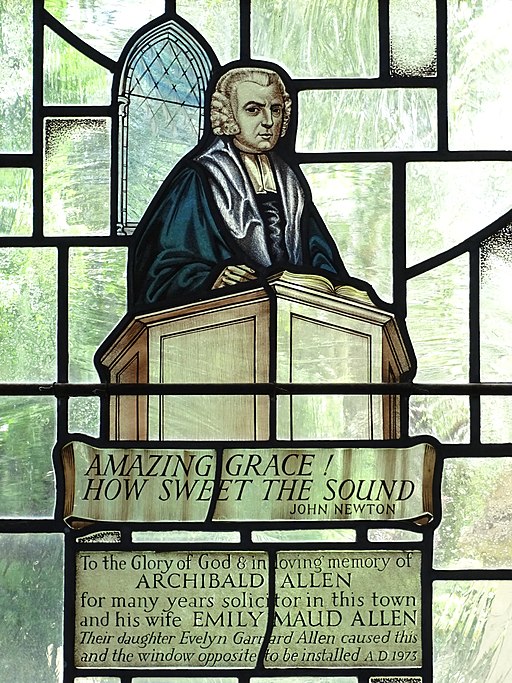
Adam Jones from Kelowna, BC, Canada / CC BY-SA (2.0)
The breath of song is the phrase, the rhythm is the drum. Our ancestors had the same sensibilities, the same hands, feet, and breath to make music and poetry, together and alone, without device or budget. My inheritance includes music, stacks of it, and the skills to compose, read, and perform came down the generations as naturally as the language learned. Oh, hear my gratitude.
In addition to spirituals, The Compromise offers hymns and shape-note singing, European classical music, patriotic songs, popular dance and drinking songs, worksongs, and seasonal songs. Here is a list of songs in the novel’s first draft.
- Amazing Grace
- Ideuma
- Auld Lang Syne
- Nut Brown Maiden
- You’ll Take the High Road
- God Bless Our Native Land
- Be Thou My Vision
- Cold Rain and Snow
- Poor Wayfaring Stranger
- O Freedom Over Me
- Nobody Knows the Trouble I’ve Seen
- There is a Balm in Gilead
- Wade in the Water
- Hold On
- Follow the Drinking Gourd
- Go Down Moses
- Down to the River to Pray
- Sweet Chariot
- Hoe Emma Hoe
- Like a Motherless Child
- Raise Them Up Higher and Higher
- Rosie
- Steal Away Home
- Yankee Doodle
- Nobody’s Fault but Mine
- My Country ‘Tis of Thee
- All Through the Night
- Erlkönig
- Oh! Suzanna
- Red River Valley
- Who Killed Cock Robin
- Froggie Went A Courting
- The Hour of Time’s Farewell
- Be Thou My Vision
- What Wonderous Love is This
- Lo, How a Rose is Blooming
- O Tannenbaum
- Erlking
- Voi Che Sapete
- Ave Maria
- Silent Night
Shape-Note Singing

The songs my characters learned in childhood and the feeling of community carry them through their young adulthood. In the next example, the song is folded into a pattern of call and response about the rights of women.
“We possess neither the children nor the livestock we raise,” I continued.
“‘Tis so!” called Eliza. We learned to speak this way under the clothesline on Saturdays.
“One day!” I said, “Women will own a piece of land to be buried in!”
Eliza sang her reply. Otis and I intoned the harmony:
Am I born to die?
To lay this body down!
And must my trembling spirit fly
Into a world unknown.
I said, “Freedom is man’s, and woman's, natural state, and any transgression thereof is betraying God.”
“Keep saying that, little sister, and it might come true.”
Ideuma, the beautiful haunting song, returns several times: as part of a prophecy, to cope with death and to prepare for it. Mariah and Eliza reinterpret the songs’ meaning. Each experience with the song becomes inbedded in the text and informs the next use.
Mariah is not a singer, but Sacred Heart music guides her towards honesty and wholeness.
Work Songs
Worksongs also find homes in The Compromise. The sisters learn from their brother about the economics of work in the developing region. Cargo is carried along the rivers to growing cities. Free laborers earned a living for their families. Forming familial bonds is essential to development, and the family as an economic unit is the future of American society.
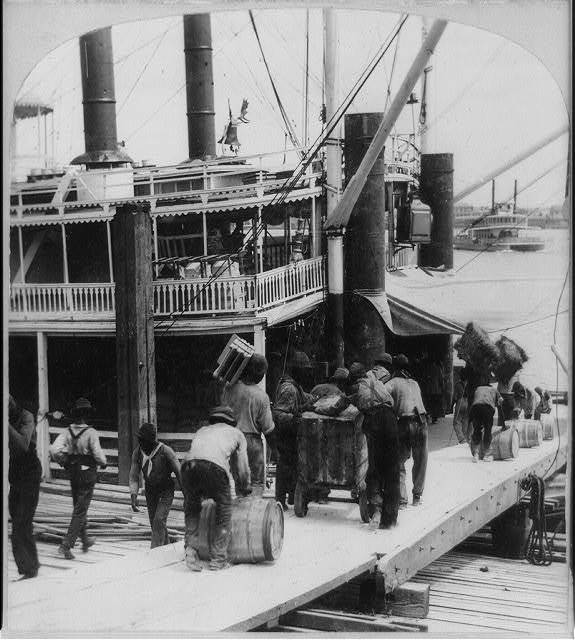
We stopped to watch rafts hauling cotton bales and bunks of lumber down the Missouri. Otis said, “See the men singing and shouting to each other? They’re working poles to keep out of the mud on shore. Those are free Negroes working for their own profits.”
We listened carefully, but only Eliza could pick out the words from that distance. A single man sang the first line and kept the rhythm.
Be my woman, gal, I’ll Be your man.
Every Sunday’s dollar In you hand.
In your hand, Lordy In your hand.
Stick to the promise, gal, that You made me
Wasn't going to marry, til-uh I go free.
In Otis’s slave narrative, the workers refuse to sing while they work to register their disapproval of management. When vindicated by an act of justice, they sing again, Hoe Emma Hoe and the crops flourish.
The Piano
My grandmother Emma transported an ornately carved Chickering square grand piano wherever she moved. The stories of her paino inspired me. Even now, I have reams of well-used sheet music along with her Christian Science Hymnal. She had a Master’s in Music Education and supported herself in widowhood by teaching music. My mother played the paino for children at school, and I studied music as a girl. Our music education had roots generations back. Collectively, we have many musical jewels in the American crown-less crown.
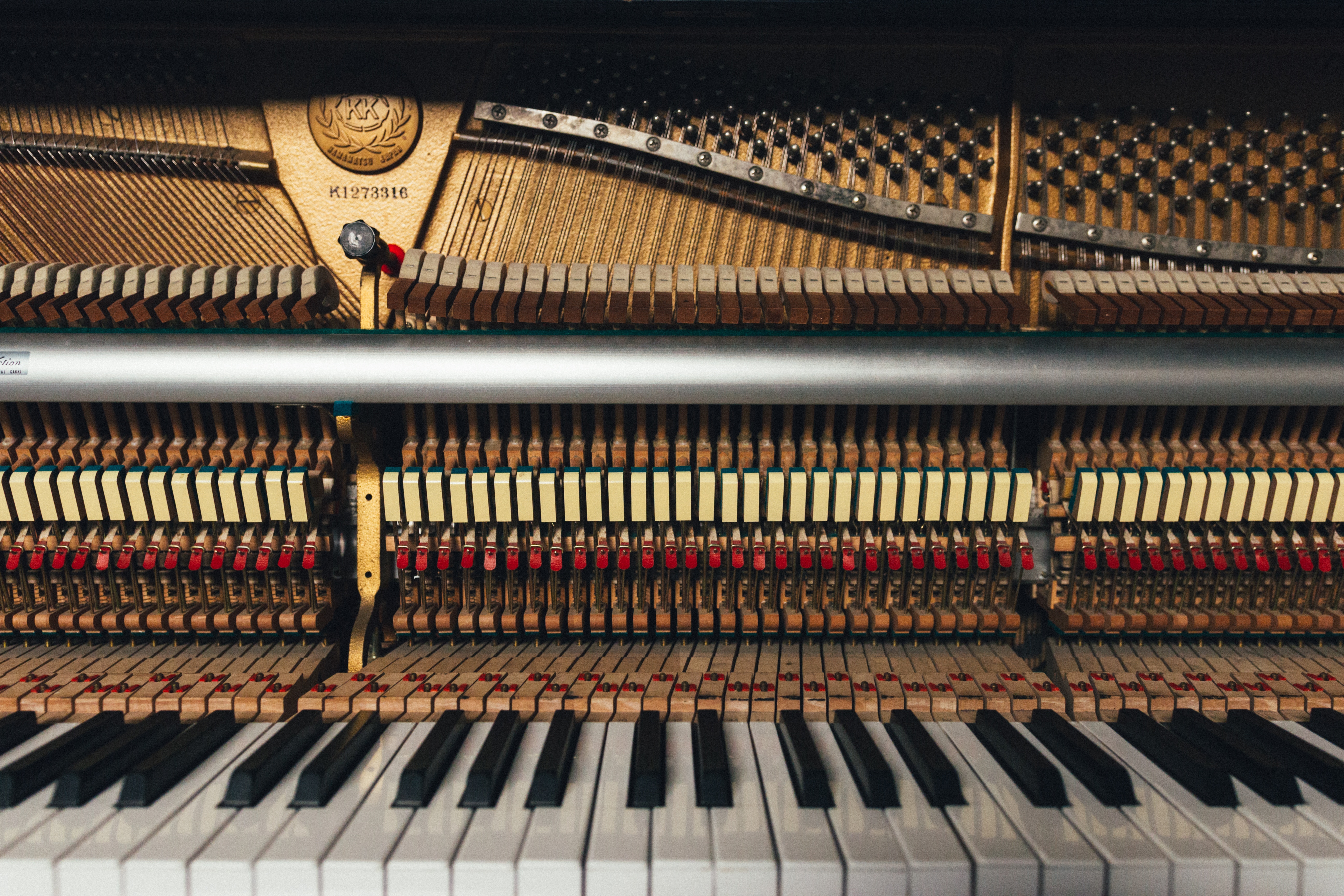
When Mariah wakes up at the Columbian Female Academy, she hears a paino for the first time. Her sister is already thriving among the girls who study music. Providing music for guests was one of the signs of cultural achievement for the middle class. Mariah does not become a musician, but she responds to the accomplishments of others.
I had vertigo when I stood and the air felt as thick as pudding, but I had to investigate the most astonishing music. It was not like a violin or a harmonica. It sounded like bells shaking the hills, like vibrations inside the earth, like sparks from kindling rising up.
A girl about Eliza’s age was practicing scales and arpeggios, hand crossing over hand. Eliza was matching the tones and beaming with triumph....
I moved closer. The steps between tones were set out on blocks that moved when pressed, but the sound came from the large wooden box up on legs. Though I could not see them, there must have been parts within the box that gave vibration to the air and to the floor and walls. The tones set everything in motion, something like a dance pulling everyone in. This paino was to change our lives.
The Compromise, “Columbia 1839”
Grief
Years later, when Richard Fowler visits Mariah in Stoneville, there is no piano for him to play, but there is a tabletop. There has been a tragedy, so he pours his complicated grief into his imaginary music, Schubert’s Erlking. I hope it also foreshadows the blizzard that Mariah fights to survive. Several of my characters, men and women, work very hard to ensure the survival of others, frequently children.
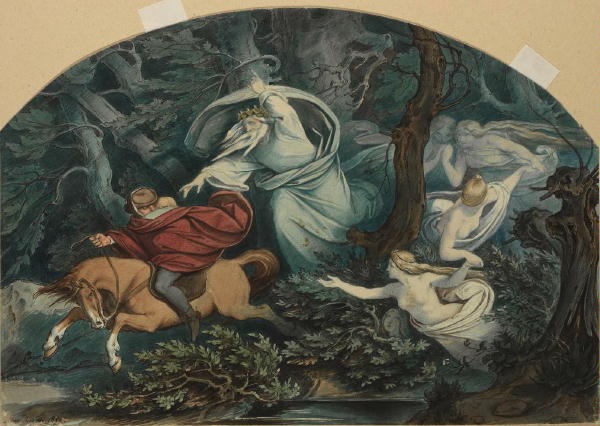
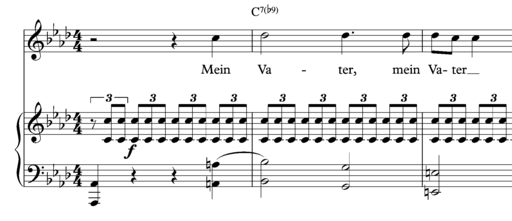
Richie’s fingers were playing the invisible piano on the table. His fingers were tapping out his anger and sorrow until his music was wild and beautiful. When he sang, I realized that I had heard it before. It made me think of Eliza coming to Stoneville as a baby in her brother’s arms, and again Eliza with her child, seeing the Erlking in the snow, but too cold and hungry to survive.... Anyone could see that he was playing the final chords over and over in his mind, which was loose as a goose those days in the cabin.
The Compromise, ‘The Blizzard 1846″
Love Songs
In the final scenes of the novel, Richie and Mariah express their love through music, both comical and dramatic. Richie uses “Froggie Went a Courtin'” with good results. Towards the end of the novel, Mariah finds her voice to sing the ancient Irish hymn at the same time she finds love. “Be Thou my Vision”
He sang quietly to hear my voice come through beside his. “Be thou my vision, O Lord of my heart. Naught be all else to me, save that thou art. Thou my best thought, by day or by night. Waking or sleeping, thy presence my light.”
I heard what I did. I sang with him and it was not a broken string or clattering tin. Then I vowed to love him always, to heal him and raise him up if he fell. He vowed to uncoil the ropes of my sadness, and to listen for my delight. This was strange to say, but honest and I would never forget it.
The Compromise, “The Blizzard 1846”
Making Music
I often reflect on the work of writing prose relative to the work of cinema. After all, the novel offers no visual effects to surprise us or sound track to guide our feelings through the script. Individuals’ talents and the coordination of talent in the film industry are truely amazing. (I watch the credits scroll to find my son’s name and then cheer.) The writer has only words, often scraped together in solitude, to trigger the reader’s senses–the play of light and shadow and the deeper alchemy of sound, smell, taste, and touch. It seems like books of words alone cannot triumph over hearts and minds trained by cinema, but I am not sure. Maybe authors are more honest when they let readers contemplate our playfully serious ways and then turn them loose to make their own.